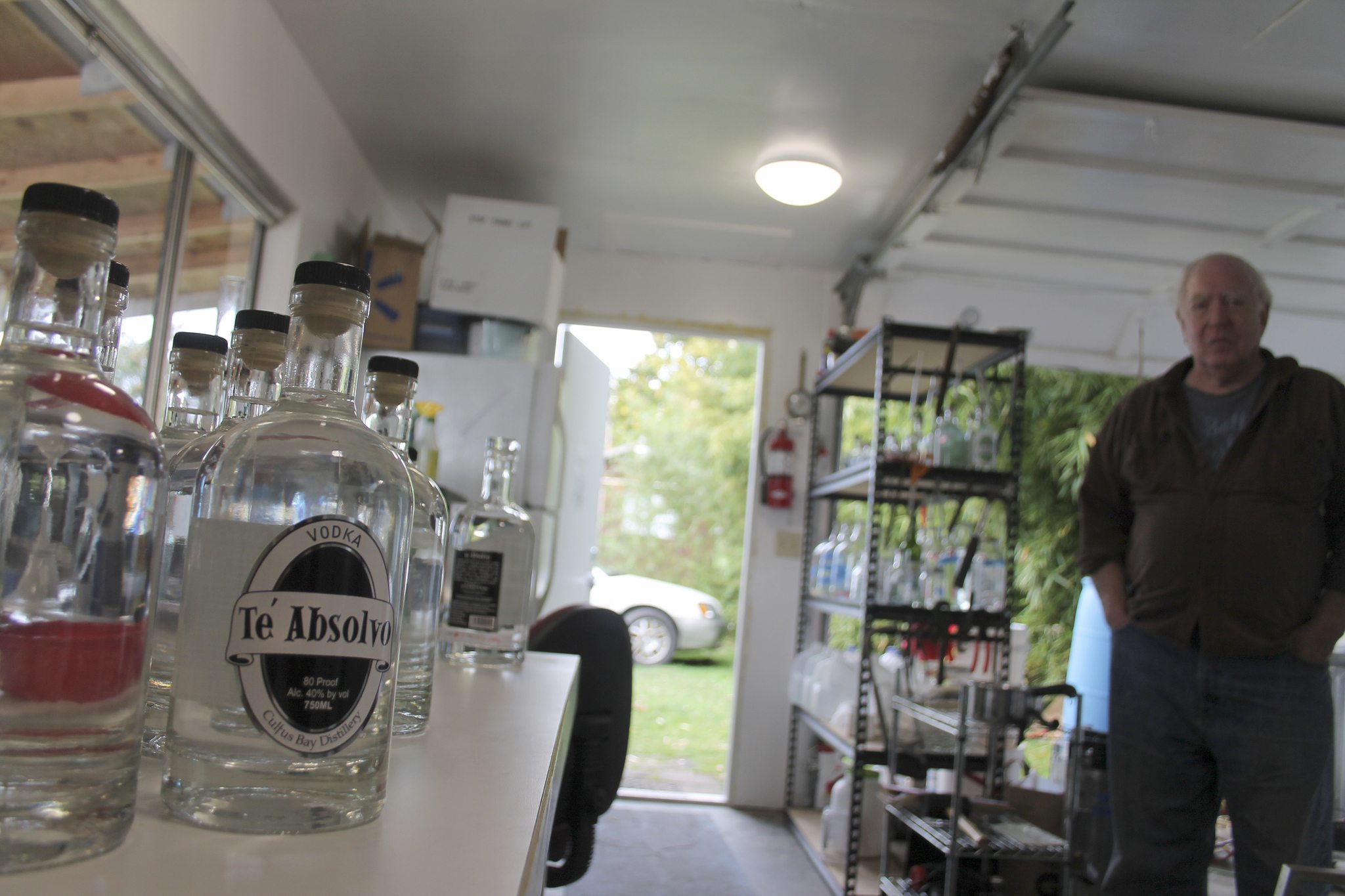After meandering through the long and arduous approval process with the Washington State Liquor and Cannabis Board, the booze scientists behind Cultus Bay Distillery have put their spirits on grocery store shelves across South Whidbey.
And with a third distillery on South Whidbey comes another step toward making the island a destination for booze tourism.
Co-owners Kathy Parks and Harry Sloan first introduced their spirits to Payless Foods about three weeks ago, and have since sold to other grocery stores on the South End. The distillery is the newest addition to a scene that includes Whidbey Island Distillery and Cadeé Distillery.
As it stands, the 288-square-foot dockside distillery in the Sandy Hook neighborhood can only make a limited amount of liquor from their small batches, which typically make 30 bottles. It’s so small, there isn’t enough space for a tasting room, but the distillers encourage customers to tour the distillery to learn about how their spirits are made.
“We’ll never be able to make a huge amount of product, but we can make some good stuff,” Bob Brunjes, distilling consultant said. “When the Irish Whiskey finishes in two years, I’ll put it against any booze.”
Cultus Bay Distillery is dubbed a “nanodistillery” by the American Distillery Institute in an upcoming book on extra-small scale spirit crafters.
The descripter isn’t used just to describe the overall size of an operation, but is also a reference to its level of involvement in the entire production and marketing process, from grain to the final product — the business even makes its own labels.
“Boy, are we nano,” Brunjes said. “We want to keep our hands in every product.”
Parks operates the distillery with Sloan and Brunjes, the engineer who built the distilling equipment by hand, out of her backyard shed that overlooks the Sandy Hook Marina. The shed has been turned into a laboratory, with all sorts of concoctions distilling in various stages.
The distillery currently makes three spirits: a poitin, which is an Irish Moonshine, a gin and its vodka called “Te Absolvo,” which in Latin translates to, “I forgive you for your sins.” Parks added an Irish whiskey will eventually be sold upon completion, and bitters are on the docket as well.
Although they’re potential competitors to other distillers on the island, other crafters in the area say the more handcrafted spirits makers, the merrier.
“Us distillers all support each other for the craft of making product,” Whidbey Island Distillery co-owner Beverly Heising said. “We’re supportive of grain to bottle distillers and we embrace and welcome them to our community.”
In fact, they share ideas and regularly discuss what each other are making.
“We’re trying not to step on other people’s toes,” Parks said. “Whatever they’re doing, we don’t want to touch.”
“I would be careful with what others are making, but so far that hasn’t been a problem,” Brunjes said. “We all end up going different directions anyway.”
Sami Postma, program director at Island County Economic Development Council, said added competition doesn’t always take customers away from preexisting businesses. Depending on the industry, similar businesses can often strengthen business.
That seems to be the case with distilleries on South Whidbey. The more distilleries there are, the more South Whidbey becomes a destination for booze tourism.
“What we call that in this industry is a cluster, where there’s a certain amount of a certain type of business and it draws people to that area, helping the businesses in the end,” Postma said. “For people who are wine or liquor lovers, the more they get here, the more of a destination it becomes.”
That’s an overarching goal for Heising and Parks: to make Whidbey a destination for craft booze tourism. And if people want to try Cultus Bay Distillery’s poitin or gin, they’ll have to come to the isle to sample since Parks doesn’t intend to sell off-island. For Parks, keeping the product as local as possible is important.
“As an ordinary islander, I enjoy products from people I know,” Brunjes said. “To buy bread from Bob and beer from Jim is fun to do.”



